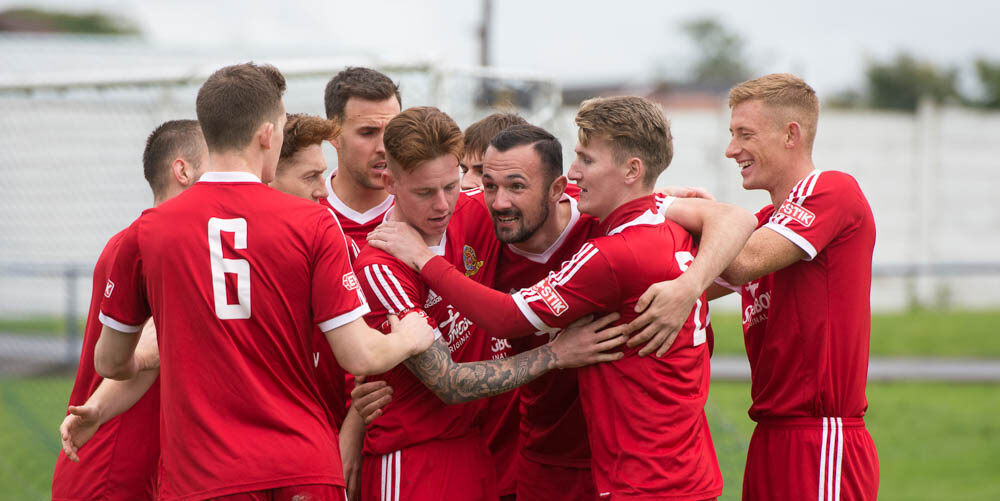By Matt Badcock
Ask anyone running a Non-League football club and they will tell you about the importance of volunteers – Ossett Town are no different.
Town were formed in 1936 when the Mayor of the Borough of Ossett charged former Yorkshire League referee John Carter with delivering the highest standard of football to the market town.
Starting out in the Leeds League, the club have slowly risen to their current Evo-Stik North position through the Yorkshire League, the Northern Counties East League and, in 1999, into the Northern Premier League first division.
Following the last restructure, Town spent seven seasons at Step 3 before relegation, although last year they were just minutes away from a return before losing out to Farsley Celtic in the extra-time of the play-off final.
This season hasn't seen quite the same league form and with the recent resignation of Grant Black, Lee Ashforth now has the task of stopping the recent bad run of results.
Contribution
But over the last six or so years, since a new committee took over, they've been busy working off the pitch too.
Chairman James Rogers first got involved with the Reds in 2001 and has been overseeing the senior team since 2011 when a whole new committee took over from the stalwarts who had been manning the fort. A big task was to modernise the way the club operated.
“We spent the first three to four years getting stability within the club and in the last two to three years we've pushed on a little bit,” he says.
“Last year we had our best season on the pitch for a long, long time. We were literally four minutes away from promotion.
“But to get into the play-offs in the first place and get so close was a significant achievement – especially when you consider our overall means compared to clubs we're competing against.”
Crucially, they've been able to increase their volunteer pool from eight to between 40 and 50 depending on the events being held at their Ingfield Stadium.
Unpaid helpers, or the lack of them, is the elephant in Non-League football's room. Clubs up and down the country are finding there might not be anyone to turn the light off at the end of the day, let alone to complete the other necessary jobs.
Rogers estimates Ossett's pool is different, however, with many in their early to mid-40s.
“There's a lot of people out there who want to help and support, but they do it for different reasons,” Rogers says. “What you need to understand is why they want to volunteer and, secondly, what they want to do.
“So somebody turns up, for example, and says, ‘I want to volunteer'. So you say right, ‘Go and empty the bins', and then do this, that and the other. You might find that in three weeks' time they're sick and tired of that so they don't come back.
Motivated
“If you start the discussion by asking what they want to achieve from being part of the club, you can then match their contribution to something they're interested in. You can then get a more sustainable approach where people stay with you longer.
“I think it's recognising volunteers aren't too different from paid employees in many ways. They want to be motivated. They want to do things where they see the value of what they're doing, they want to be thanked and appreciated for what they're doing.
“Not in monetary terms, because they're volunteering, but in other ways. I think if you can get that right you'll get people to roll their sleeves up and join in with the team effort.
“As chairman of the club I also roll my sleeves up. They don't see me sitting on a pedestal watching them do all the work.
“They see me empty the bins, do the gate and do anything else that needs doing. Because, while I am chairman, it's a team effort. There's no hierarchy other than me having some extra responsibility as chairman. By setting that as the ethos of the way the clubs works, we've got a really good team ethic, where people feel part of something and collectively achieving something.”
Some clubs suffer from a perception they don't need help or it is a closed shop, something Ossett make sure isn't the case.
“If you don't work in an open and transparent way, a lot of people who want to volunteer don't actually think you need the support because you're not really inviting the offer,” Rogers says.
“Or, when you get the offer, you're potentially misusing it so they don't feel part of the team. It's a tricky one to get right.
“We all have day jobs and families and we all have pressures from that. It's also recognising when one of us has pressure from elsewhere that we cover that responsibility so they don't feel guilty they've got a work pressure and suddenly can't volunteer for a month.
“It's having that understanding that we all appreciate that happens and, therefore, we'll be flexible.”
Of course seeing the progress on the pitch helps and earlier this season Ossett reached the FA Cup fourth round qualifying and earned a home replay with Solihull Moors.
Their 1,167 gate the highest gate for a competitive match since the 1950s. While they haven't kicked on in the league since then, new boss Ashforth has high hopes they can push up the table.
Ashforth has been a number one at Harrogate Railway, but has spent most of his coaching career as an assistant.
He hadn't any thoughts about returning to the hotseat until Black left and the club offered him the chance.
“I came home and spoke to the wife to get her thoughts – we've just had a new-born baby on December 13 – and she said, ‘Why not, you enjoyed it last time',” Ashforth says.
“We're part-time but I don't care what anyone says, Non-League management is a full-time job. It takes up all your time.
“But for me, and I said this when I was at Harrogate, when you're a kid you spend all your time playing Football Manager and things like that and I'm getting to live the dream.”
Added nous
In experienced midfielders Nicky Boshell, ex-Guiseley, and former York City man Craig Nelthorpe, he has added nous but says a side that largely has been performing well doesn't need major surgery.
“Anybody would tell you they punched above their weight last year,” he says. “To get as close as they did was an unbelievable achievement. Same with this year and getting to the FA Cup fourth round qualifying – it's massive for a club like Ossett Town.
“But football moves on all the time. Look at clubs who have been in the Premier League who are in League One now. You've got to live in the moment and enjoy the moments as they happen. And then what will be will be as you move forward.
“It's my job now to stabilise the team, stabilise the club. We've lost ten out of 11 so it's not like I'm taking over a team on a good run of form.
“The first job has got to be to stop those defeats and make sure a defeatist attitude doesn't kick in and then we can look at finishing the season on a high.
“The club have been successful so it's not about making masses of changes because that's come for a reason. It's finding out what made that success, making sure the players buy into how I want to play, making sure we train properly and getting that first result.”
*This article originally featured in The @NonLeaguePaper, which is available every Sunday and Monday





















